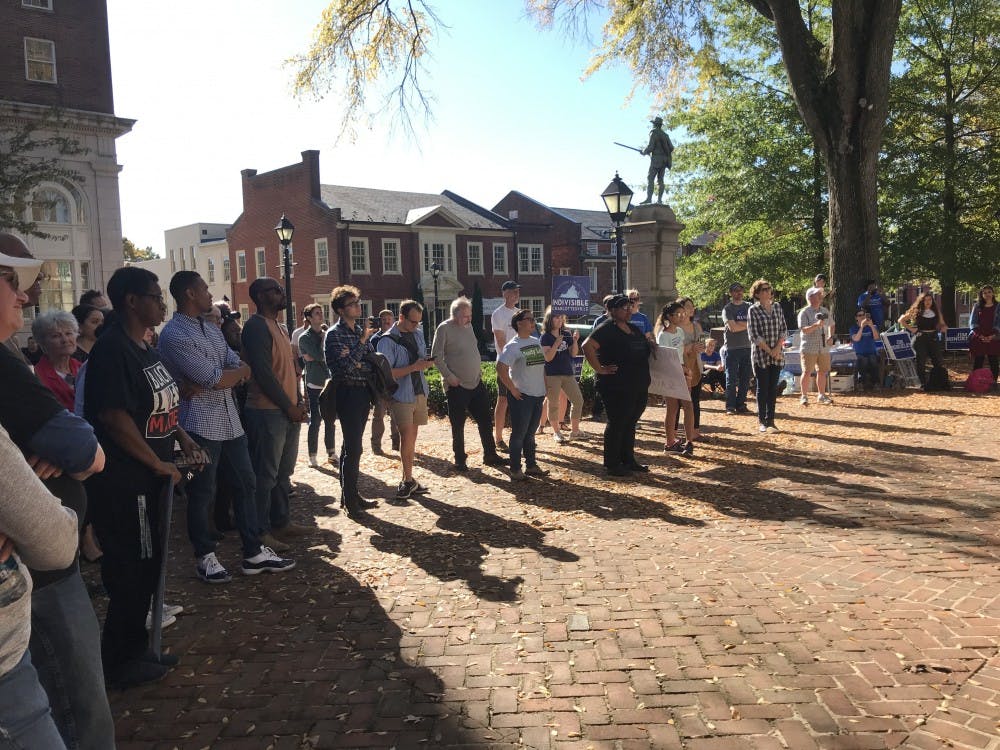Jim Hingeley, Democratic candidate for Albemarle County Commonwealth's Attorney, held a Rally for Justice on the steps of the Albemarle Courthouse Sunday afternoon to draw attention to his campaign for criminal justice reform. Guest speakers included community leader Linda Perriello; University Law Professor Anne Coughlin; Mary Bauer, a local lawyer and executive director of the Legal Aid Justice Center; Zy Brant, a community activist and first-year College student and Robert Gest III., retired Air Force colonel and NAACP life member.
Approximately 60 people were in attendance, along with 15 of Hingeley’s campaign members.
The rally aimed to address the current state of the Commonwealth’s criminal justice system, focusing on issues of mass incarceration, the school-to-prison pipeline and Republican Commonwealth attorney Robert Tracci’s decision not to prosecute white supermacists involved in the events of Aug. 11 and 12, 2017, in which white supremacists involved in the violent Unite the Right rally marched on the University’s Lawn and Downtown Charlottesville.
Tracci’s campaign website notes his office’s involvement after the events, as the Aug. 11 demonstration that was held on Grounds fell under Albemarle jurisdiction.
“Following these events, this office prosecuted criminal offenders, resulting in the conviction and ban of a defendant from the Commonwealth of Virginia,” the statement reads, in reference to Albemarle County’s decision to ban white supremacist Christopher Cantwell for five years. Cantwell pled guilty to assault on to anti-racist counter-protestors.
“This office has sought justice against other offenders, and has been forward-leaning in encouraging those affected by the events of August 11, 2017 to report criminal misconduct to law enforcement at the University of Virginia Police Department and other law enforcement agencies,” the statement continues.
Geremia Di Maro, a member of Hingeley’s communications team, commented on Tracci not bringing white supremacists involved in the rallies to court, and how Hingeley’s campaign will address the issue.
“Tracci has failed to seek justice, failing to seek justice for the victims of that night, and just more broadly failing to seek justice for members of the Albemarle County community because policies of mass incarceration are keeping people in prison for longer than they need to be,” Di Maro said.
Di Maro attributed this to Tracci’s disregard for the “burning objects statute,” a policy in Virginia that makes it illegal to wield a burning object in public in an attempt to intimidate another person. Tracci does not see the policy to be applicable to the actions demonstrated by the white supremists, who carried torches during the protest.
In reference to Hingeley’s plans for change, Di Maro said “one of the things for this event and the campaign is really seeking justice for those victims who were attacked that night.”
Perriello opened the Rally with a call to activism, encouraging the crowd to knock on doors, send postcards and engage in difficult conversations with fellow citizens to advocate for change in the criminal justice system and rouse voter support for Hingeley.
Coughlin echoed Perriello’s call for voter activism with an emphasis on the importance of the position of the Commonwealth Attorney, the elected prosecutor of felony crimes in Albemarle County — the district in which the majority of the University resides.
“Criminal justice is not blind,” Coughlin said. “It's administered through the eyes of the person who sits in that seat. What are that person's values? What is their human judgment? How willing are they to listen to people in the community?”
Coughlin added, “I believe that Jim Hingeley will be that that person, can be a tremendous force for good.”
Following Coughlin, Bryant spoke to the effects prosecution of the community's youth has on the trajectories of their futures.
“Because we're scared of conflict, because we don't want to have tough conversations, then the people who need us the most are going to continue to be silenced, marginalized and disenfranchised,” Bryant said.
After an introduction from Guest, Hingeley took the stage to speak on the issue of mass incarceration and how it historically, disproportionately affects the African American community.
Hinegely remarked on how combating this issue will help lead to an end for racial injustice. He introduced his idea for the development of a system that will track that data of the prosecution decision making process.
“A data collection system within the prosecutor’s office that keeps track of the statistics and compares decisions that are being made in different cases to see what is actually going on," Hingeley said. "This is my plan, and this is my commitment to achieving racial justice."
CORRECTION: This article previously misquoted Hingeley as saying his plan was a "system that keeps track of the statistics and decisions that are being made in different places to see what is actually going on." It has been updated to reflect a more accurate transcription, in which Hingeley says his plan is a "data collection system within the prosecutor’s office that keeps track of the statistics and compares decisions that are being made in different cases to see what is actually going on."





